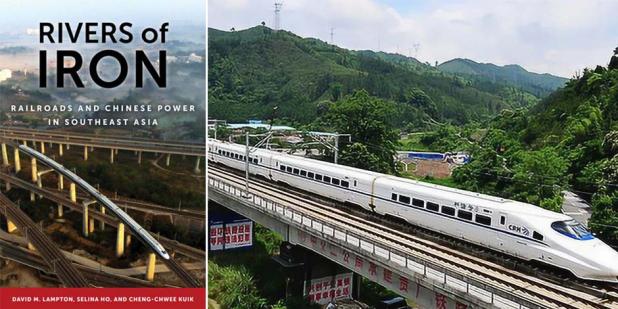Join us for a free one-day workshop for educators at the Japanese American National Museum, hosted by the USC U.S.-China Institute and the National Consortium for Teaching about Asia. This workshop will include a guided tour of the beloved exhibition Common Ground: The Heart of Community, slated to close permanently in January 2025. Following the tour, learn strategies for engaging students in the primary source artifacts, images, and documents found in JANM’s vast collection and discover classroom-ready resources to support teaching and learning about the Japanese American experience.
Video: David Lampton on China’s effort to create an intercountry railway system
The USC U.S.-China Institute talks with author David M. Lampton on his new book, which examines China’s effort to create an intercountry railway system connecting China and its seven Southeast Asian neighbors.

Video is also available on our YouTube channel.
 David M. Lampton is Senior Research Fellow at the SAIS Foreign Policy Institute and Professor Emeritus at Johns Hopkins--SAIS. Previously, he was Oksenberg-Rohlen Fellow at Stanford University’s Asia-Pacific Research Center from 2019-2020. For more than two decades prior to that he was Hyman Professor and Director of China Studies at the Johns Hopkins University School of Advanced International Studies. Lampton is former Chairman of the The Asia Foundation, former President of the National Committee on United States-China Relations, and former Dean of Faculty at SAIS. Among many written works, academic and popular, he is author of Same Bed, Different Dreams: Managing U.S.-China Relations, 1989-2000 (UC Press, 2001); The Three Faces of Chinese Power: Might, Money, and Minds (UC Press, 2008); and, Following the Leader: Ruling China, from Deng Xiaoping to Xi Jinping (UC Press 2014 and 2019). His most recent book (with Selina Ho and Cheng-Chwee Kuik) is, Rivers of Iron: Railroads and Chinese Power in Southeast Asia (UC Press, 2020). He received his B.A., M.A., and Ph.D. degrees from Stanford University in political science where, as an undergraduate student, he was a firefighter.
David M. Lampton is Senior Research Fellow at the SAIS Foreign Policy Institute and Professor Emeritus at Johns Hopkins--SAIS. Previously, he was Oksenberg-Rohlen Fellow at Stanford University’s Asia-Pacific Research Center from 2019-2020. For more than two decades prior to that he was Hyman Professor and Director of China Studies at the Johns Hopkins University School of Advanced International Studies. Lampton is former Chairman of the The Asia Foundation, former President of the National Committee on United States-China Relations, and former Dean of Faculty at SAIS. Among many written works, academic and popular, he is author of Same Bed, Different Dreams: Managing U.S.-China Relations, 1989-2000 (UC Press, 2001); The Three Faces of Chinese Power: Might, Money, and Minds (UC Press, 2008); and, Following the Leader: Ruling China, from Deng Xiaoping to Xi Jinping (UC Press 2014 and 2019). His most recent book (with Selina Ho and Cheng-Chwee Kuik) is, Rivers of Iron: Railroads and Chinese Power in Southeast Asia (UC Press, 2020). He received his B.A., M.A., and Ph.D. degrees from Stanford University in political science where, as an undergraduate student, he was a firefighter.
Featured Articles
Please join us for the Grad Mixer! Hosted by USC Annenberg Office of International Affairs, Enjoy food, drink and conversation with fellow students across USC Annenberg. Graduate students from any field are welcome to join, so it is a great opportunity to meet fellow students with IR/foreign policy-related research topics and interests.
RSVP link: https://forms.gle/1zer188RE9dCS6Ho6
Events
Hosted by USC Annenberg Office of International Affairs, enjoy food, drink and conversation with fellow international students.
Join us for an in-person conversation on Thursday, November 7th at 4pm with author David M. Lampton as he discusses his new book, Living U.S.-China Relations: From Cold War to Cold War. The book examines the history of U.S.-China relations across eight U.S. presidential administrations.




